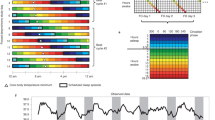Abstract
A COMMON approach to the understanding of human circadian rhythms is to study their modifiability. Attempts to replace the 24 h sleep–wakefulness rhythm in man by cycles of slightly altered length (for example, 21 or 27 h) have had some success1,2. Attempts to produce sleeping–waking rhythms which are a multiple of the natural cycle length such as 12 or 48 h have not, however, been very successful2,3; the reasons for this are not yet clear.
This is a preview of subscription content, access via your institution
Access options
Subscribe to this journal
Receive 51 print issues and online access
$199.00 per year
only $3.90 per issue
Buy this article
- Purchase on Springer Link
- Instant access to full article PDF
Prices may be subject to local taxes which are calculated during checkout
Similar content being viewed by others
References
Lewis, P. R., and Lobban, M. C., Quart. J. Exp. Physiol., 42, 356 (1957).
Kleitman, N., Sleep and Wakefulness, 175 (Univ. Chicago Press, 1963).
Dement, W., Science, 131, 1705 (1960).
Author information
Authors and Affiliations
Rights and permissions
About this article
Cite this article
MEDDIS, R. Human Circadian Rhythms and the 48 Hour Day. Nature 218, 964–965 (1968). https://doi.org/10.1038/218964a0
Received:
Revised:
Issue Date:
DOI: https://doi.org/10.1038/218964a0
This article is cited by
-
The Arctic as an Environment for Research on Rhythms
Nature (1969)
Comments
By submitting a comment you agree to abide by our Terms and Community Guidelines. If you find something abusive or that does not comply with our terms or guidelines please flag it as inappropriate.



